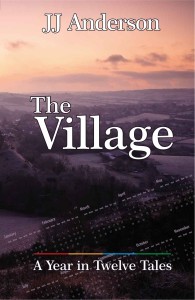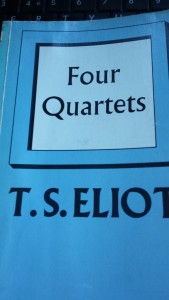Every work of literature owes something to that which precedes it. No writer can create a story which doesn’t somehow call upon other stories which they have read or absorbed and no reader, of age and experience, can read a story without placing it among or alongside other stories. So ‘The Village’ must have its literary antecedents. The first is ‘Under Milk Wood’ by Dylan Thomas with which it shares its opening line ‘To begin at the beginning’. That ‘play for voices’ is set in another imaginary village, Llareggub.
which they have read or absorbed and no reader, of age and experience, can read a story without placing it among or alongside other stories. So ‘The Village’ must have its literary antecedents. The first is ‘Under Milk Wood’ by Dylan Thomas with which it shares its opening line ‘To begin at the beginning’. That ‘play for voices’ is set in another imaginary village, Llareggub.
Thornton Wilder is another influence and it is his description of his play ‘Our Town’ , which was set in the fictional Grover’s Corners, which influences the whole of ‘The Village’. ‘The life of a village in the life of the stars’ he said, so I have tried to place the annual cycle of my village’s life into stellar alignment. Thus we have the Regimental mascot – the goat – for Capricorn in ‘Sunday’. Molly carries water in ‘The Volunteer’ for Aquarius, and so on, but not all are so obvious. What violence there is in the stories fall within the constellations most associated with fire, so, April, August and December. Please note, these are not meant to be astrological references, a la Eleanor Catton’s ‘The Luminaries’.
Poetry is represented. There is a quotation from W.B.Yeats’ ‘An Irish Airman Foresees His Death’ in ‘Sunday’, when Ray, the protagonist, imagines ‘tumult in the clouds’. The poem is about WWI, not WWII, but was chosen for other reasons. In ‘In Calley Wood’ there is another first line, of Wordsworth’s poem ‘Resolution and Independence’ – ‘There was a roaring in the wind all night’. For those unfamiliar with the poem, it follows a young man, the Wordsworth of The Prelude, engaging with the natural world and meeting a solitary ‘nature spirit’, in that case a leech-gatherer. The protagonist emerges, changed, from the encounter.
Molly Morgan, in ‘The Volunteer’ was a character who almost wrote herself, but she owes much to Patrick White’s heroine in his short story ‘A Cheery  Soul’. As discussed in an earlier post – Oh to be in England – ‘Not Even Waving’ is a reference to Stevie Smith’s poem, ‘Not Waving but Drowning’ and represents the situation of the protagonist, Diane. In ‘Open Gardens’ a character quotes the first line of Gray’s ‘Elegy written in a Country Churchyard’ to other characters while standing in St Agnes churchyard, next to its ‘ivy mantled tower’. Andrew Marvell is its guiding spirit.
Soul’. As discussed in an earlier post – Oh to be in England – ‘Not Even Waving’ is a reference to Stevie Smith’s poem, ‘Not Waving but Drowning’ and represents the situation of the protagonist, Diane. In ‘Open Gardens’ a character quotes the first line of Gray’s ‘Elegy written in a Country Churchyard’ to other characters while standing in St Agnes churchyard, next to its ‘ivy mantled tower’. Andrew Marvell is its guiding spirit.
‘The Summer Fete’ is a bloodless English homage to the Scottish play, Macbeth. A King is, as Paul’s text would have it, ‘stabbed in the back’ by an ambitious couple, Scott and Beth Castle. Having abandoned attempts to render ‘Come you murdering ministers…’ into modern, conversational English, I placed a paraphrase of Macbeth’s ‘If it were done…’ lines at the start of Act I, Scene VII into Beth’s soliloquy in the Park House parlour. The direct quote is from Act V, Scene I, ‘Foul whisperings are abroad’ an appropriate description of what can be found on social media every day, I thought. In the story it refers to Paul’s text.
‘The Fourth Estate’ is a nod to Trollope’s Barchester Chronicles, particularly ‘The Warden’, though here church takes on press using law, rather than the other way about. Tanya Towers’ ‘What has fairness to do with the law? ‘ plays upon the Archdeacon’s ‘What has morality to do with the Church? ‘. ‘In the Salon’ is my admiring offering to Jane Austen, in which Diane quotes Mr Bennett directly ‘For what do we live but to make sport for our neighbours…’ and there are characters both prideful and prejudiced.
 The other over-arching influence across the stories is T.S.Eliot. He is why there is the desiccated rose garden in ‘Harvest’. He too references the whirling constellations ‘the dance along the artery, the circulation of the lymph, are figured in the drift of stars’. And prompts my Introduction and Coda because ‘the end of all our exploring will be to arrive where we started and know the place for the first time’.
The other over-arching influence across the stories is T.S.Eliot. He is why there is the desiccated rose garden in ‘Harvest’. He too references the whirling constellations ‘the dance along the artery, the circulation of the lymph, are figured in the drift of stars’. And prompts my Introduction and Coda because ‘the end of all our exploring will be to arrive where we started and know the place for the first time’.
I don’t imagine readers spotted all these references, but I try to write fictions which work on a number of levels. That doesn’t mean that a reader has to respond to all of them and, indeed, some may say they are so well hidden as to be invisible, but I suspect that depends on what you are looking for. It might be a reason why the stories would be worth reading again, at some later time, to see what you haven’t seen before. Thank you for reading.
The first Eliot quote is from ‘Burnt Norton’, the second from ‘Little Gidding’, two of ‘The Four Quartets’. For an inventive exploration of the relationship between author and reader try Italo Calvino’s ‘If on a winter’s night, a traveller’, if you haven’t already.


 RSS – Posts
RSS – Posts